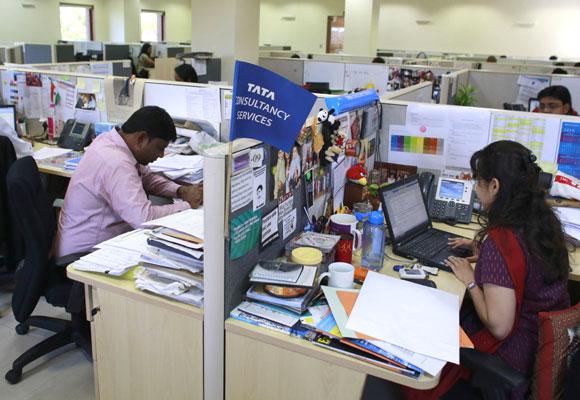Photographs: Patrick Fallon/Reuters Divya Nair
Hear it from people who have been there and done that to understand why you should stop feeling guilty of taking that sabbatical and rather find ways to reclaim your career.
For a nation that prides itself on having one of the largest workforces in the world, the number of working women in India stands at a dismal 24 per cent.
According to a report compiled by the Centre for Technology and Innovation in 2013, about 36 per cent women quit their jobs to raise children, look after their elderly parents, and meet other personal demands.
While some women manage to find and resume work later, an increasing number find it difficult to bounce back, either due to family commitments or due to their inability to find a job that allows them to have a work-family life balance.
This can lead to stress and frustration, and affect a woman's emotional well-being.
Indian companies are, unfortunately, not open to making adjustments that accommodate women (and men too, should they wish it) who have family commitments.
So, women have to find their own ways of getting back to productive careers.
To discuss how best to achieve this, People Konnect, an HR solutions company organised a career fair in Mumbai (partnered by Rediff.com, DNA and Yourstory.in).
Read on to find out what they had to say:
Please click NEXT to continue reading...
Create something new, be an entrepreneur
Image: Tara Sharma with her familyPhotographs: Tara Sharma/Twitter.com
The only celebrity from tinsel town to attend the event, Tara Sharma, holds a degree from the London School of Economics.
She confessed that motherhood had indeed affected her film career, but it also awakened the entrepreneur in her.
"After I became a mother, I stopped getting good films. Instead of being disappointed and accepting failure, I chose to conceptualise a show where I could be myself, spend time with my kids, and at the same time talk to other mothers like me who wanted to share pregnancy and parenting tips.
"Instead of sitting at home and stressing myself over what I had lost, I chose to create work with what I had.
"Since I had the best of education, I had the confidence to walk into Johnson and Johnson and present my idea, the Tara Sharma Show, without the help of a consultant or a manager.”
The Tara Sharma Show has had two successful seasons and the mother of two is planning the next installment of the travel show.
In her advice to women, Tara said: No one in the world has the right to judge a mother’s work-life balance. If you have been a full time mother, you have already mastered skills like time management, patience and the ability to take quick decisions."
Stay updated, stay connected
Image: The Tata Group is one of the few organisations that induct women into the work front after they return from a career beakPhotographs: Reuters
When you return to work after a break of three or four years, a lot of things will have changed in the organisation and also in your field of work.
Colin Mendes, general manager-HR, of Tata Sons, who oversees the Tata Second Careers for women initiative, advises women to stay in touch with their colleagues through social media and other networks during the break.
"You must stay updated about the trends in your profession. If there is a new skill upgrade course available, see if you can attend that.
"Reintegration into the workforce is a challenge, particularly if you have taken more than a year’s break.
"You must ensure that you are well aware of what’s happening and what has changed in your absence so that you can adapt accordingly."
Be prepared for surprises
Image: When resuming after a career break, keep aside your prejudicesPhotographs: Adnan Abidi/Reuters
One likely change will be that an employee who was once your junior has moved up the ladder, and may have even become your manager, warns Amitabha Sen, executive vice president-HR, Kotak Mahindra Bank Ltd.
"Mental preparedness becomes crucial at such times. Internal shuffling of employees and their relative successes should not de-motivate you," he counsels.
Reinvent yourself; look good, feel good
Image: To reclaim your self confidence, reinvent your personalityPhotographs: Arko Datta/Reuters
Success is all about projecting a positive image of yourself through your appearance and actions, said image consultant and career coach, Chetana Mehrotra.
"When you are applying or resuming service after a break, you are bound to feel different because your body and mind feel different. Some of you may have put on weight while others may find it difficult to cope with the social and emotional pressures of bringing up a kid.
"You may not be comfortable dressing the way you used to before you took the break. At such times, it is important that you reinvent yourself.
"Let's not forget that everyone has an independent image -- the way you dress, the way you communicate and the way you handle responsibilities make you what you are and ultimately defines your success,” says Mehrotra who has trained corporate professionals at American Express, Genpact, IBM, HP and NIIT.
Her advice to women who are contemplating returning to their careers, is: Learn to celebrate your life with all the good, bad and ugly that it has to offer you. Just as it's important to look good, it is as important to feel good.
Work-life balance, a misnomer?
Image: While it may be difficult to attain the perfect work-life balance, aim for work-life integrationPhotographs: Yuriko Nakao/Reuters
Nikhila Rangaswamy, director-HR, Kellogg India Ltd who took a two-year break and opted to work from home, says family support plays a pivotal role in inspiring women to resume their careers.
She shares the following tips for aspiring women professionals.
- Get your support system right -- be it your husband, in-laws or friends.
- Divide the work accordingly and ensure that your calendar and your partner's don't clash.
- While making a choice, ask yourself what are the compromises and sacrifices you will have to make and work out your priorities accordingly.
- Work-life balance is a misnomer, accept it; instead aim for work-life integration.
- If you have a kid or an ageing parent, between you and your partner, make a list of who's managing what and stick to it. In case of emergencies, ensure you have a contingency plan.
Sreenivasa Yadavelli, managing director of FutureStep India said it's important not to sound defensive about the break you have taken.
He advises:
- Don't benchmark yourself with what you have already achieved or had planned to achieve. You could be better off in a different role and in a different sector and achieve more success than you did earlier.
- Use the break to reassess your priorities and career goals.
- Make use of the fortunate situation and look at semi- and quasi-entrepreneurial programmes by setting up franchisees of already existing brands and services.
- Use the time to learn new skills and build your CV.
- Don't make a career decision based on the compensation offered to you. Be prepared to take a salary cut and focus on building new skills that are inclined to the goals and success of the organisation you intend to join.
CV and interview tips
Image: Invest in a well structured, error-free resumePhotographs: Kshitij Anand/Reuters
Sharing statistics from his own experience, Sreenivasa Yadavelli says that six out of 10 CVs he receives in a day have grammatical and spelling errors -- an area he specifically asks women professionals to pay attention to.
- Invest in a well structured, grammatically correct CV. Mistakes in a CV imply that the candidate is not serious about the job and will discourage the employer almost instantly.
- An ideal CV should not stretch beyond 10 lines (Times New Roman font size 14). Even if you have more than 10 years of work experience, it should be less than a page and a half.
- If you have taken a career break, never be defensive about it. If you took a break to look after your child or family, realise that it’s a proud and bold choice you’ve made, so don’t hide it. In fact, highlight the break and use it as a virtue and talk about it in the interview.
- Be vocal about your reasons to get back to work -- even if it means you saying: I need money to support my family, hence I want to work.
- Do not hesitate to ask for help or request your friend or senior to help you with an appointment for an interview. Use your references and reach out to people. Don’t be afraid to face rejection, move on; there are plenty of opportunities for you to explore.
- Stay in touch with relevant people and be part of communities that are relevant to your sector.
- The future is not going to be monster.com or naukri.com. People have already moved to more transparent and quicker mediums -- joining communities on social networks can be a great help to you.
- If you have the right skills and are eager to learn and adapt, compensation will never be a problem.








Comment
article